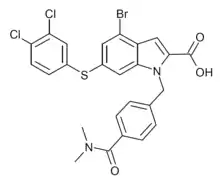 | |
| Identifiers | |
|---|---|
| |
| CAS Number | |
| PubChem CID | |
| Chemical and physical data | |
| Formula | C25H19BrCl2N2O3S |
| Molar mass | 578.30 g·mol−1 |
| 3D model (JSmol) | |
| |
| |
HY-124798 (Rheb inhibitor NR1) is the first compound to be developed that acts as a potent and selective inhibitor of Rheb, a GTP-binding protein which acts as an endogenous activator of the mechanistic target of rapamycin (mTOR) subtype mTORC1. Since many of the side effects of rapamycin and its analogues are thought to result from binding to the other subtype mTORC2, it is hoped that selective inhibition of mTORC1 should have a more selective effects profile. As mTORC1 and mTORC2 have binding sites that are very similar in structure, it has been challenging to develop highly subtype selective inhibitors, making indirect inhibition via modulation of other messenger proteins such as Rheb an attractive approach. However, since HY-124798 has a relatively weak IC50 of 2.1μM, and Rheb also has other targets in addition to mTORC1, it remains to be established whether it will deliver the hoped for improvements in pharmacological profile.[1][2][3][4]
See also
References
- ↑ Mahoney SJ, Narayan S, Molz L, Berstler LA, Kang SA, Vlasuk GP, Saiah E (February 2018). "A small molecule inhibitor of Rheb selectively targets mTORC1 signaling". Nature Communications. 9 (1): 548. Bibcode:2018NatCo...9..548M. doi:10.1038/s41467-018-03035-z. PMC 5803267. PMID 29416044.
- ↑ Hodson N, West DW, Philp A, Burd NA, Moore DR (December 2019). "Molecular regulation of human skeletal muscle protein synthesis in response to exercise and nutrients: a compass for overcoming age-related anabolic resistance". American Journal of Physiology. Cell Physiology. 317 (6): C1061–C1078. doi:10.1152/ajpcell.00209.2019. PMC 6962519. PMID 31461340.
- ↑ Dumas SN, Lamming DW (January 2020). "Next Generation Strategies for Geroprotection via mTORC1 Inhibition". The Journals of Gerontology. Series A, Biological Sciences and Medical Sciences. 75 (1): 14–23. doi:10.1093/gerona/glz056. PMC 6909887. PMID 30794726.
- ↑ Heras-Sandoval D, Pérez-Rojas JM, Pedraza-Chaverri J (January 2020). "Novel compounds for the modulation of mTOR and autophagy to treat neurodegenerative diseases". Cellular Signalling. 65: 109442. doi:10.1016/j.cellsig.2019.109442. PMID 31639492. S2CID 204850661.